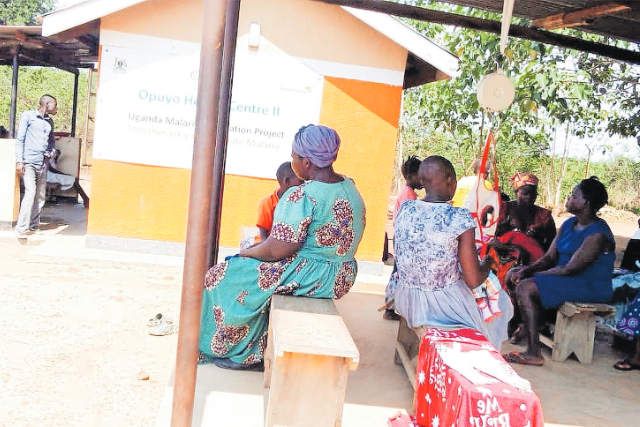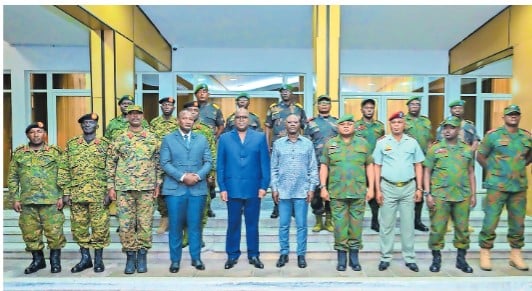Low-income patients suffer as drug stockouts persist in govt units

Patients wait to be attended to at Opuyo Health Centre II in Soroti District at
the weekend. PHOTO | SUSAN NANJALA
What you need to know:
- Stakeholders say the majority of such patients are low-income earners and that asking them to buy medicines from private facilities is like condemning them to death.
Stakeholders say the majority of such patients are low-income earners and that asking them to buy medicines from private facilities is like condemning them to death.
When Ismail Mutebi, who has a mental disorder, visited Masaka Regional Referral Hospital last week, he wasn’t attended to as expected.
Doctors cited a reported drug stockout at the public facility.
A resident of Kirimya Trading Centre in Kimaanya Kabonera Municipality, Masaka City, Mutebi says he has consistently missed ‘special medicine’ at Ward 14.
“This shortage has lasted four months. They only prescribe the medicine, which l buy from private pharmacies outside the hospital," he says.
"I need at least Shs50,000 every month to purchase the medicine, but sometimes I fail to raise the money and this is likely to affect my recovery process,” he says.
Ms Winfried Namubiru, a market vendor at Masaka Central Market, also shares a similar ordeal. She says due to accumulated bills for purchasing medicine from private pharmacies, she was forced to take her daughter to Butabika National Mental Referral Hospital, located close to 140kms away.
"They [medics] were referring us to private pharmacies to buy medicine, which was not sustainable. So I decided to take my daughter to Butabika for medical help,” she explains.
Mr Swaibu Makumbi Sulambaaya, the chairperson of Masaka Hospital Patients Association, says the majority of patients who seek health services from Masaka Regional Referral Hospital are low-income earners and that asking them to buy medicines from private facilities is like condemning them to death.
“I have received numerous complaints from patients and their caregivers and when I visited Ward 14 [where patients with mental orders get medicine ] ,I was surprised when one of the health workers I found at the ward openly said that they often turn away patients because they don’t have drugs,” he says
Mr Charles Tumushiime, a principal administrator at the referral hospital, admits that the facility suffers from drug stockouts.
“It is true that the hospital suffers some stock out of essential medicines towards the end of the cycle, but this is normally solved within a few days. As a principal administrator I confirm that we received drugs on October 3 and we currently have no shortage,” he says.
Delayed deliveries
In Jinja District, many lower-level health facilities last received medical supplies in July. According to Dr Peter Dyogo, the Jinja District health officer, essential drugs such as Coartem, which is used for treating malaria, have been missing in various health facilities for the last three months.
“The National Medical Stores did not send Coartem to the health centres and we don’t why,” he says
The Senior Medical Officer at Kiyunga Health Centre IV in Luuka District, Dr Aaron Kenneth Nabongho says the health centre has a list of close to 15 types of essential drugs that are currently out of stock.
“We have a drug stockout; drugs like Amoxil have not been available in our stores for a month now,” he says.
Mr Peter Okello Odeke, a senior principal administrator at Lira Regional Referral Hospital, says the facility always suffers persistent drug stockouts.
He says when delivered, the drugs cannot last a month because of the huge patient numbers they have.
In the eastern district of Tororo the situation is not different. Mr John Okeya, the district chairperson, says the majority of government health facilities have recorded a decline in outpatient attendance because of lack of essential medicines and other medical supplies.
''Many patients have now resorted to going to private clinics outside government health facilities to access medical care but they have to dig deeper into their pockets,” he says.
“The budget that the National Medical Stores is using to allocate medical supplies to Tororo was made 10 years ago when the population was still at 500,000, but now it's over 800,000 people, on top of that ,our health facilities are also competed for by communities from the neighbouring districts and western parts of Kenya,” he adds.
In Lamwo District, insufficient drugs dispensed to health facilities are also a problem. According to the District Health Officer, Dr Denis Ocula Omoya, both drug supplies and staffing at Palabek-kal Health Centre IV stand at 12 percent.
Mr Thompson Obong, the Lamwo chief administrative officer, says: “We had only two health Centre IVs in the district, located at Madiopei and Padibe town councils ,but the new health centre IV, Palabek-kal, still receives limited medicines and we have reported this to the Health Ministry.”
“We have a very good infrastructure, but the equipment is not there and the drugs are lacking, especially the essential ones,” Dr Patrick Kijumi, Palabek-kal Health Centre IV-in-charge, says.
But Dr Richard Mugahi, the commissioner for Reproductive, Maternal and Child Health at the Health Ministry, says, “The issue of drugs came out in the report that facilities like Palabek-kal Health Centre IV still receive quantities of drugs for a health Centre III , I want to pledge that effective July next year, Palabek-kal Health Centre IV and other facilities that face a similar problem will be getting drugs at the desired level and quantity.”
Ms Sheilla Nduhukire, the spokesperson for the National Medical Stores (NMS), last week said the delivery of medical supplies and ready-to-use therapeutic food to northern Uganda was scheduled for this week.
She said the delay was caused by the total shutdown of Karuma Bridge late last month. Movement along the Kampala-Gulu highway was on September 23 restricted following the total shutdown of the bridge that links northern Uganda to South Sudan and the Democratic Republic of Congo.
“For other areas we have endeavoured to deliver all essential supplies according to the schedule since this financial year began. We have delivered drugs and other medical supplies to all health facilities in the country, including hard–to–reach districts such as Kalangala and Buvuma, in fact, there has been no delay this time as it was the case in the past two years, " Ms Nduhukire explained.
Dr Richard Bbosa, the Buikwe District health officer, says they used to suffer an acute shortage of some essential drugs in the past but the situation has slightly improved.
“There is a notable improvement in the delivery of supplies. However, we ask NMS to address the issue of anti-malaria drugs that get finished in a few weeks,” he says.
Dr Stephen Banonya, the Jinja City Health Officer, says the facilities have received two sets of supplies, which, he says had never happened before.
“Our biggest challenge now is a shortage of manpower since the population that needs our services has increased,” he says.
Dr Fredrick Daniel Isabirye, the Buyende District health officer, says this time around, medical supplies by NMS have greatly improved.
“All our health centres that used to experience drug shortages are currently receiving the supplies in time unlike those previous financial years and we commend NMS for this,” he says.
Kabale District health educator Alfred Besigensi and the Kisoro District assistant health officer-in-charge of maternal and child health, Ms Annet Dusabe, both say they have not had any drug stock out in the past three months.
Compiled by Al-Mahdi Ssenkabirwa, Tobbias Jolly Owiny, Denis Edema, Robert Muhereza, Abubaker Kirunda, Tausi Nakato, Antonio Kalyango, Bill Oketch, Joseph Omollo & Fred Wambede.




